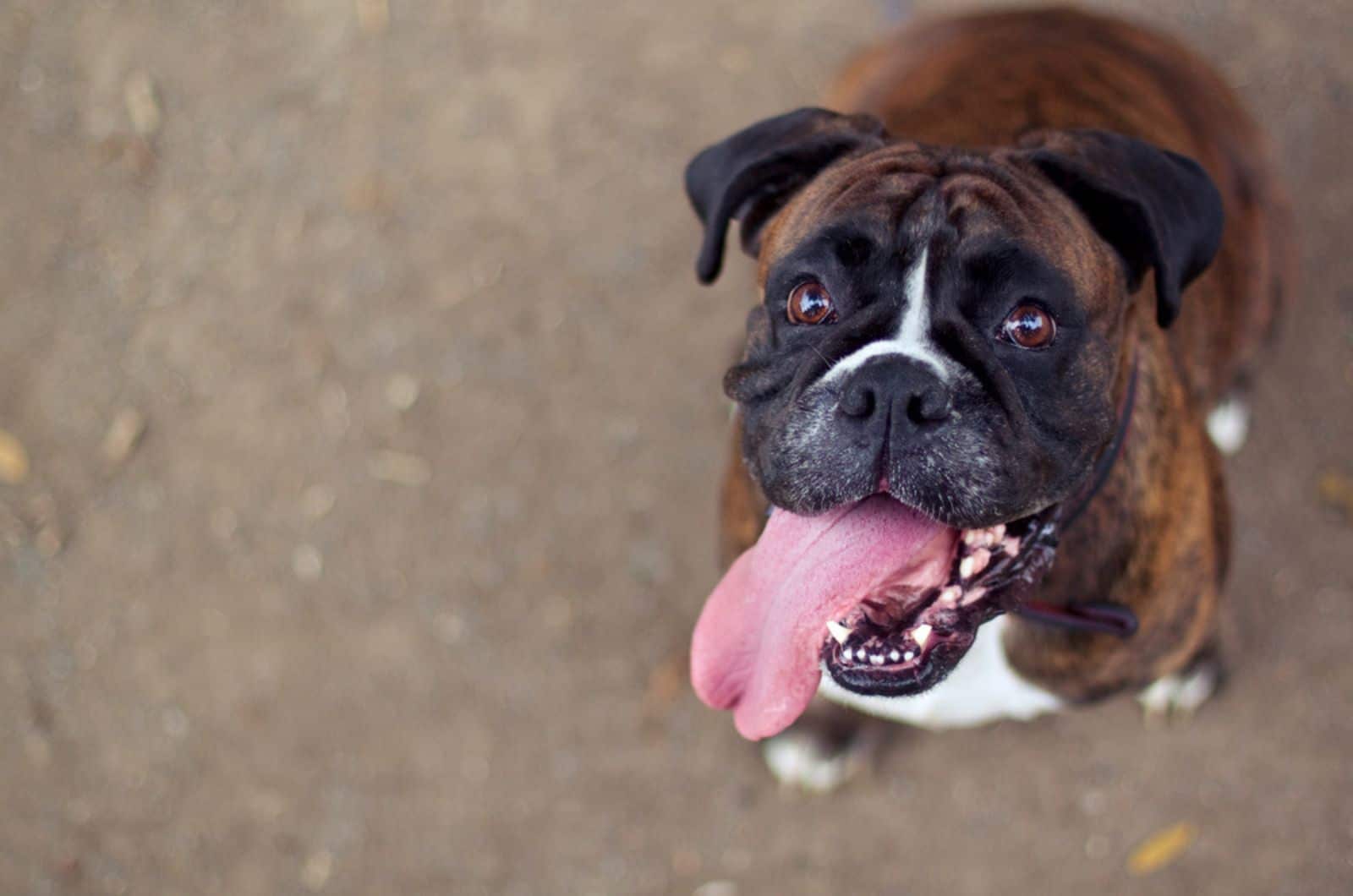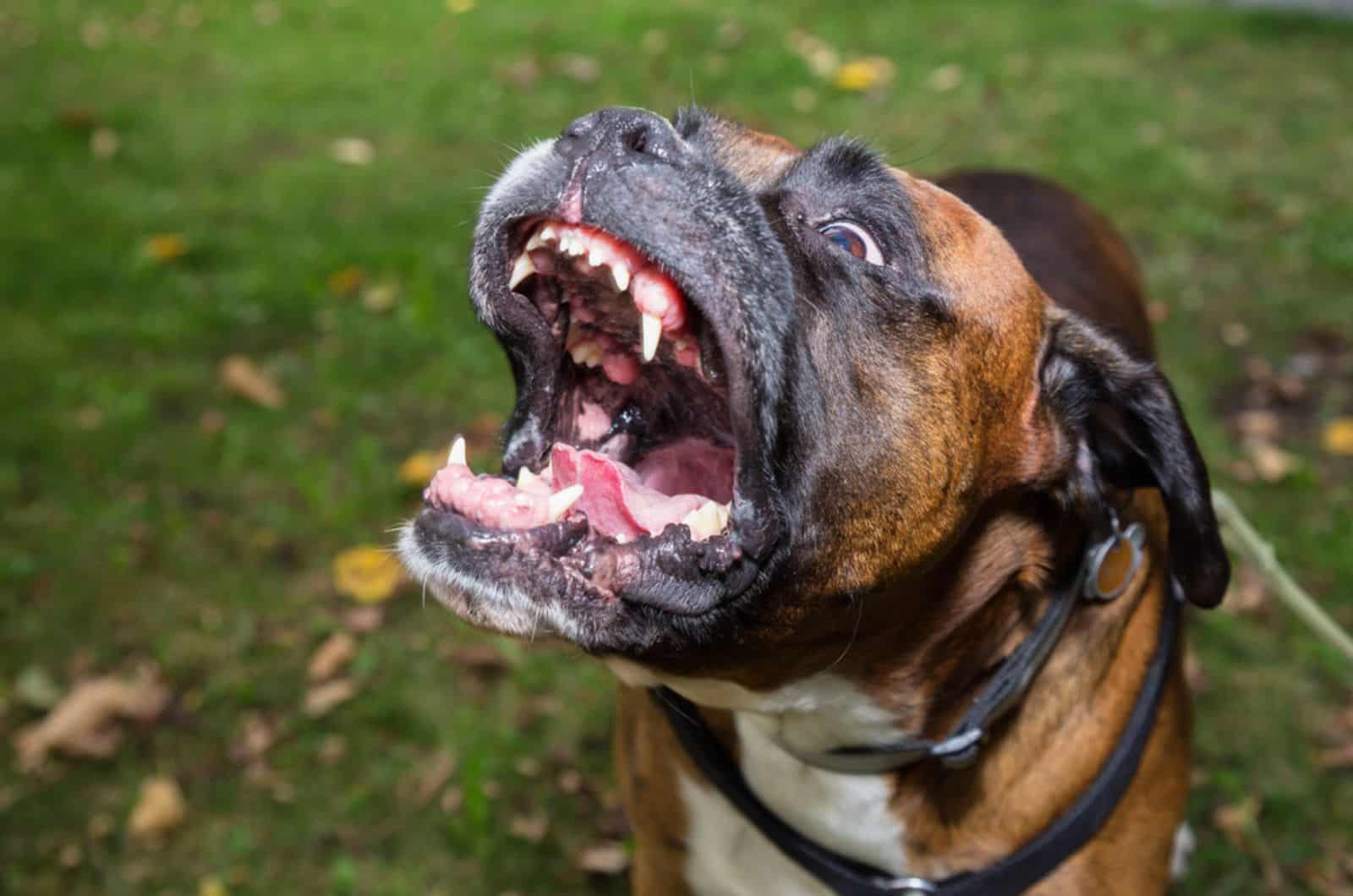Before explaining why Boxers are the worst dogs, we feel that it’s important to point out that no dog breed is actually “the worst” (they are all great!), but some of them are simply more challenging to own than others.
With that disclaimer out of the way, we can now approach the topic and provide some insight into why Boxers are the worst dogs.
In this article, we will describe eight challenges that often come with owning one of these dogs, along with some useful advice that can help you deal with them.
Finally, we will also point out some of the positives of this dog breed, in order to give you a balanced view of the breed.
So, without further ado, let’s get into it.
Why Boxers Are The Worst Dogs

Let’s state the obvious first: Boxers are adorable. These cute little doggies are a joy to have around most of the time, but hey, nobody’s perfect.
There are certain cons that come with owning this breed and if you are looking to adopt a Boxer, you should be aware of them. Lots of people consider them a scary breed, but that’s just plain wrong.
In fact, knowing these challenges in advance will help you prepare on time and get the best out of your new pet. Remember, if you provide a Boxer with everything that it needs and give it all the love it deserves, it can be an incredibly loving companion.
With all that in mind, let’s now get into the eight reasons why Boxers are the worst dogs.
1. Extra High Energy Levels
Boxers are high-energy dogs, known for their playful and energetic personalities. This energy level can make them great companions for active families or individuals.
However, this high energy level can also make it difficult to tire them out. Boxers need regular exercise to stay happy and healthy, and failure to provide it can lead to behavioral issues such as destructive scratching, chewing, or excessive barking.
To meet their exercise needs, Boxers require daily walks, runs, or playtime in a securely fenced yard. Boxers are also known to enjoy activities like hiking, swimming, or playing fetch.
It’s important to note that Boxers are working dogs, and they need a job to do, without it they can become bored, anxious, and destructive. So it’s important to find an activity that can channel their energy in a positive way.
It’s crucial for potential Boxer owners to understand the importance of providing ample exercise and mental stimulation, as failure to do so can lead to behavior problems and unhappiness for both the dog and the owner.
2. Difficult To Train
Boxers are known to be stubborn and independent dogs, which can make training a challenge. This trait can be partly attributed to their strong will and intelligence.
Consistency and positive reinforcement are key when it comes to training a Boxer. They respond well to rewards-based training, where they are rewarded for good behavior rather than being punished for bad behavior.
Boxers are highly trainable, but they need a leader who is confident and consistent. They respond best to a firm but fair training style. They are not recommended for first-time dog owners who are not familiar with training techniques.
They require patience, consistency, and a lot of time and effort.
Obedience classes can be a great way to tame the Boxer temperament. Not only do they provide a structured environment for training, but they also offer the opportunity to socialize with other dogs and people.
Professional trainers can also be a great resource for those who need extra help with training.
It’s important to note that Boxers are known to have a strong prey drive, which means they may have a strong inclination to chase after small animals. This should be taken into account when training them to walk on a leash or when letting them off-leash in an open area.
3. They Can Be Aggressive

Boxers are generally described as energetic, playful, and friendly dogs. They are known to be good with children and other family pets, although they may have a high prey drive towards small animals.
This fact, combined with their muscular body and unusual underbite, makes a lot of people think they are a dangerous dog breed.
However, any dog, regardless of the breed, can develop aggressive behavior if they are not properly socialized, trained, and cared for. Aggressive behavior can also be caused by genetics, health problems, abuse, or neglect.
It’s important to note that Boxers are guard dogs, which means they are protective of their family members, and will guard their home and family if they feel the need to.
This behavior can be trained out of them if it becomes a problem, for example if the dog bites someone, but it’s important to be aware that it is a natural instinct.
Proper socialization, training, and care can help prevent aggressive behavior in Boxers. It’s important to get a Boxer from a reputable breeder and to provide them with proper care, training, and socialization throughout their life.
4. They Can Get Loud
Boxers can make a lot of noise, such as barking or whining, when they are excited or want to play. Additionally, Boxers are known for their deep and loud bark, which can be intimidating for some people.
However, this does not mean that Boxers are loud dogs per se, as barking is a normal behavior for dogs, but it’s important to note that excessive barking can be a sign of an underlying problem such as separation anxiety, lack of exercise, or lack of training.
5. They Need Constant Stimulation
Boxers are highly intelligent and active dogs that require a significant amount of mental stimulation to keep them happy and healthy. They are known for their high energy levels and love to play, explore and learn new things.
Mental stimulation can take many forms, such as training, agility, interactive toys, and puzzle toys. Training exercises, such as obedience training, agility, and tricks, can provide mental stimulation and help to build the bond between the owner and the dog.
Puzzle toys and interactive toys, such as treat-dispensing toys, can also provide mental stimulation and help to keep the dog entertained. They are not the type to just lay around in a kennel all day.
Boxers also benefit from activities that challenge their mind, such as scent work, tracking, and search and rescue. These activities can help to channel their energy and curiosity in a positive way.
No wonder they are a frequent choice for police dogs!
The amount of mental stimulation a specific Boxer needs can vary depending on the individual dog’s age, energy level, and personality. However, as a general rule, Boxers should have at least 30 minutes to an hour of mental stimulation and training per day.
6. Anxiety And Separation Anxiety

Anxiety is a common behavioral issue in dogs, and Boxers are not immune to it. Anxiety can manifest in various forms such as separation anxiety, noise phobia, or fear of certain people, animals, or environments.
Boxers are known for being very loyal and attached to their owners, so separation anxiety can be a common issue for them.
Separation anxiety in Boxers can manifest as destructive behavior, excessive barking, whining, or attempting to escape from the house.
Noise phobia, on the other hand, can manifest as excessive barking, shaking, or hiding during thunderstorms, fireworks, or other loud noises.
There are several ways to help a Boxer cope with anxiety, including providing them with a comfortable and safe environment, proper training, and socialization. Training can help them build confidence and trust in their owners, as well as teach them coping mechanisms.
It’s important to be patient and consistent when dealing with a dog with anxiety. It’s a process that takes time and effort, but with proper care and the right training methods, a Boxer with anxiety can live a happy and fulfilling life.
7. Grooming Needs — Will My Boxer Shed A Lot?
Boxers shed much more than you would think such a short-haired breed does. They do it all year round, with shedding becoming more pronounced in the spring and fall.
They are not exactly Retrievers or German Shepherds, but they still leave a lot of hair around the house.
This is referred to as “blowing coat” and it’s a natural process of shedding old fur to make way for new growth. It gets worse with age, as older Boxers tend to shed more fur.
It’s important to note that regular brushing can help to remove loose hair and help to control shedding. A rubber curry brush or a hound glove can be used to remove loose hair, and help to distribute natural oils throughout their beautiful brindle coat (other colors are also available!).
Additionally, feeding a high-quality diet and providing regular exercise can also help to reduce shedding.
8. Potential Health Issues
Boxers are prone to certain health issues. Some of the most common health issues that affect them are listed below.
It’s important to note that many of these health issues can be prevented or managed with proper care, regular vet check-ups, and genetic testing. Additionally, it’s important to choose a reputable breeder who screens their breeding dogs for these conditions.
Cardiomyopathy
Boxers are prone to a heart condition called cardiomyopathy, which can cause the heart muscle to weaken and eventually fail. This condition is usually detected through a heart murmur or arrhythmia and can be treated with medication or surgery.
Cancer
Boxers have a higher-than-average incidence of cancer, particularly in the form of lymphoma and tumors of the skin, bones, and mammary glands. Regular vet check-ups and screenings can help to detect cancer early and improve the chances of successful treatment.
Hip Dysplasia
This is a genetic condition in which the hip joint is malformed, leading to arthritis and pain. Boxers can be prone to hip dysplasia, which can be treated with medication, surgery, or a combination of both.
Bloat
Boxers are also prone to a condition called bloat or Gastric Dilatation Volvulus (GDV) where the stomach distends and twists, cutting off blood flow. This is a serious and life-threatening condition that requires immediate medical attention.
Allergies
Boxers can be prone to skin allergies, which can cause itching, rashes, and hot spots. Allergies can be caused by food, environmental factors, or parasites.
Related post: A Closer Look Into Testing For Allergies In Dogs
Degenerative Myelopathy (DM)
This is a progressive disease of the spinal cord in older dogs. It is a rare genetic disorder that affects the nerve cells in the spinal cord, causing weakness and eventually paralysis of the hind legs.
What Are The Pros Of Owning A Boxer?

After listing all the challenges and drawbacks of owning Boxer dogs, it’s only fair that we counter that with some positives.
After all, there are plenty of people out there who own a Boxer and are absolutely enjoying it!
Boxers are a popular and beloved breed known for their energetic and playful personalities. Affectionate and loving towards their owners, they are loyal and protective of their family making great companion dogs.
Playful and energetic, they are great for active families or individuals who love to play and explore. Additionally, they are known to be protective of their family and home, making them good watchdogs who have a strong guarding instinct.
Boxers make great companions and can provide a lot of love, loyalty, and entertainment to their owners.
Should I Get A Boxer?

When considering getting your first Boxer, it’s important to weigh the pros and cons of the Boxer dog breed to determine if they are the right fit for you and your lifestyle.
Boxers are known to be affectionate, playful, and intelligent dogs that are good with small children and make great companions.
However, they are also known to be prone to certain health issues such as cardiomyopathy, cancer, hip dysplasia, bloat, drool, and allergies; in addition to some of the other negatives that we mentioned before.
In general, owning a dog, regardless of the breed, requires a lot of time, effort, and commitment.
If you are an active individual or family, have the time and resources to provide proper care, training, and socialization, and are willing to take on the responsibilities of owning a pet, then a Boxer may be a wonderful dog for you.
If you do choose to get one, then you might want to decide whether you want a male or a female. To help you with that decision, you can read one of our most popular posts related to Boxers.
Conclusion
So those were our eight reasons why Boxers are the worst dogs to own. In addition to covering the challenges of owning a Boxer, we wanted to caveat that by talking about all the benefits that these dogs can bring into your life.
Like with all things in life, owning a Boxer is not black and white, and you should always carefully weigh all the factors before deciding to adopt a Boxer puppy.
Read next: 10 Best Boxer Breeders: Places To Buy Your Future Puppy
